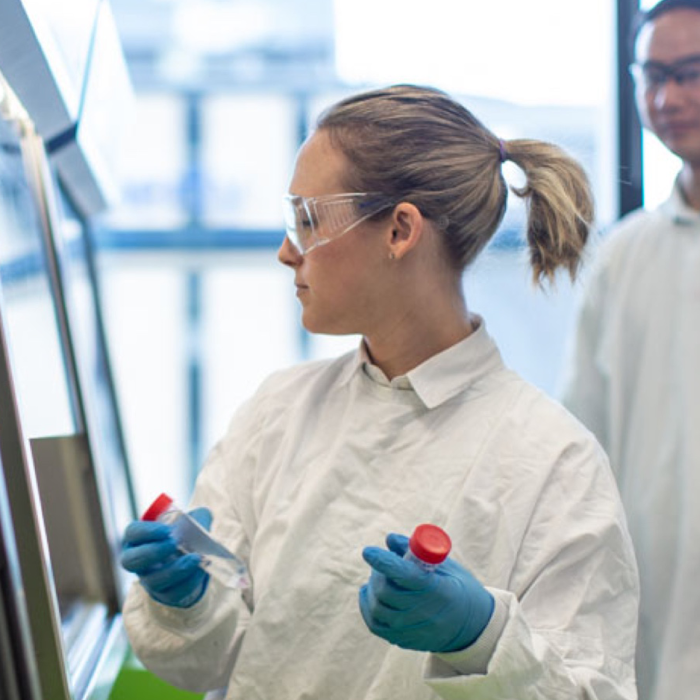Every Monday from 1pm – 2pm notable cancer researchers, clinicians, nurses and other experts from around the globe share their insights, research or news on a broad range of topics at the VCCC Alliance Monday Lunch Live forum.
The following area contains all our recordings from 2020.
Emerging Leaders in Cancer Research
Monday Lunch Livestream
With Dr Sarah Best, Dr Simon Keam and Dr Jessica Da Gama Duarte
13 July 2020
Showcasing the latest exciting developments in basic, translational and clinical research and will provide opportunities to develop collaborations among Victorian institutes.
Postdocs from across the VCCC Alliance will share highlights of their research for this special Monday Lunch Live event. Moderated by SciComm specialist, Dr Clare Fedele, these effective communicators of cancer research will showcase in the areas of new therapeutic approaches to treat lung cancer, a novel blood test to predict response to immunotherapy, and using radiation therapy to boost immune responses in prostate cancer.
Identifying therapeutic approaches to treat KEAP1-mutant lung adenocarcinoma
Dr Sarah Best, Walter and Eliza Hall Institute
Sarah is involved in a research program undertaking a multi-parametric approach to understand KEAP1-mutant lung cancer. The KEAP1/NRF2 pathway is a key regulator of the oxidative stress response, which is hijacked in cancer cells. KEAP1-mutant lung cancers are an aggressive chemo- and radio-therapy resistant subtype for which no personalised treatment options are available in the clinic, resulting in poor outcomes for patients. The research program has elucidated key aspects of lung adenocarcinoma pathology and novel metabolic treatment modalities. Sarah will explain how the KEAP1-mutant lung adenocarcinoma is dependent on the activity of the Pentose Phosphate Pathway, a unique metabolic dependency that can be therapeutically targeted.
The untapped potential of radiation therapy to make immunotherapy a reality for prostate cancer patients
Dr Simon Keam, Peter MacCallum Cancer Centre
Simon’s research focuses on using radiotherapy as tool to induce an immune environment in the prostate that is capable of responding to immunotherapies – opening the door for the treatment prostate cancer and other solid tumours with immune-based therapies. In this presentation, he will describe a recent study of using internal radiation (brachytherapy) to convert cold prostate tumors to more activated ones, and how this relates to the potential for new therapeutic approaches to eliminate cancer at the early stages. This has broad implications for ongoing clinical research into overcoming the obstacles to the success of these treatments, as well as the highlighting the possibility of avoiding treatments with unwanted side effects. The outcomes for this research also pave the way for a deeper understanding of how radiation therapy interacts with the immune system and how this can be exploited in creative ways.
Predicting immunotherapy outcomes in cancers
Dr Jessica Da Gama Duarte, Olivia Newton-John Cancer Research Institute
Effective immune engagement with a tumour occurs when immune cells recognise and destroy malignant cells. However, tumours have developed multiple ways of escaping immune attack, often leading to uncontrolled tumour growth. Serological cancer-specific antibodies produced by B cells upon malignant cell recognition are a form of immune engagement that have been proposed to stratify patients and predict treatment response.
Jessica develops a custom protein microarray able to detect antibodies against over 100 tumour markers in parallel using only one drop of blood with high sensitivity. She will explain further that with this array, the depth and breadth of antibody responses against cancers can be detected with high sensitivity and how they use these antibody responses to predict treatment response to immunotherapy.
Jessica’s presentation will discuss how patient stratification based on each individual’s extent of immune engagement will prevent patients from unnecessarily undergoing immunotherapeutics with the risk of severe side-effects which they will not respond to.
Enabling patients to undertake other therapies that may be beneficial, and prevent further tumour development, potentially leading to improved treatment outcomes and survival rates, thereby reducing health care costs and the burden of disease on society.
Resource details

This course is brought to you by
Alliance members
